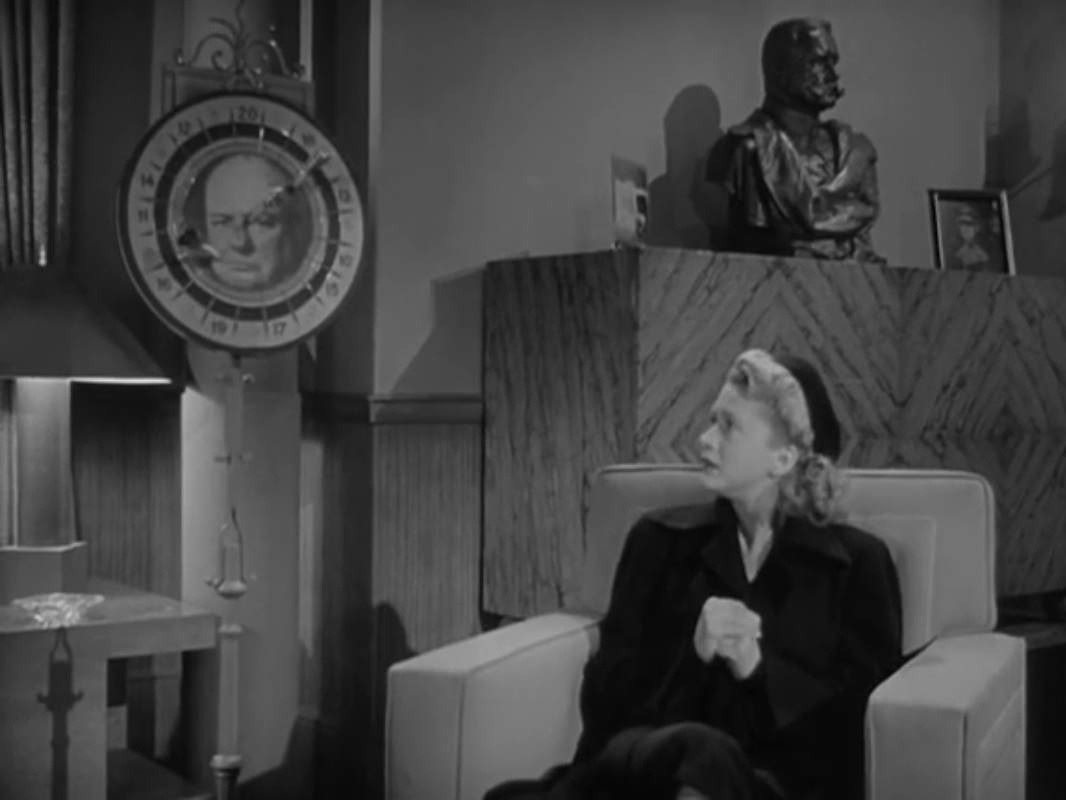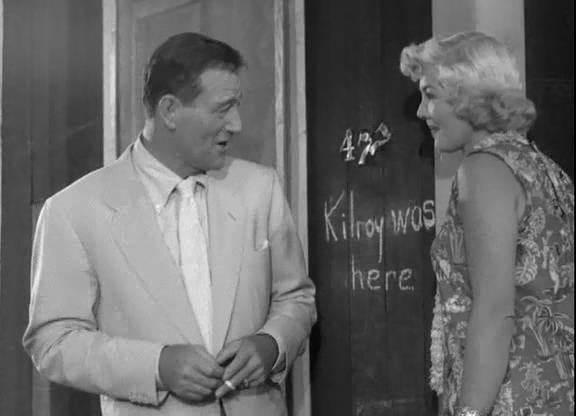The Man Who Reclaimed His
Head
From war, from
the usurpation of his publisher, who loses it to the munitions-makers who
collude and connive even with the enemy to sustain the war until the essential
commodity is exhausted, and that is patriotism.
A great
masterpiece by a director of genius, “overwrought and underdone”
according to Andre Sennwald of the New York Times, “far from a
smash” (Variety), an
“oddball period melodrama” (Halliwell’s
Film Guide, the film is set in France at the time of the Great War).
Claude Rains the
writer, Joan Bennett his wife, Lionel Atwill the
publisher.
With the evidence
in his old kit bag, the writer tells the histoire
to an old friend from the Lycée Condorcet,
now the best lawyer in Paris.
Adventure in Manhattan
An absolutely
shocking masterpiece (“a mild melodrama,” according to Nugent of
the New York Times, who was shocked at the portrayal of journalists).
A false play of
the trenches and no man’s land (Fury’s Road) at the Alvin
Theatre masks a tunnel burglary at the Commercial National Bank next door.
The cast put on a
show for the crime reporter, the leading actress is destitute, a straying wife
thrown out who returns to find her young daughter dead, a Press Club ruse to
deflate a genius.
He lies doggo
later on, feigning depression to throw the mastermind off.
Joel McCrea, Jean
Arthur, Reginald Owen as a Stateside Mabuse, Thomas Mitchell as the editor.
The Last Gangster
He goes down for
income tax evasion, a vicious murderer, the No. 1 crime boss, and when he gets out
ten years later his old gang with some new blood torture his hoard of loot out
of him, his wife’s remarried, his own son doesn’t know him, he dies
protecting the kid at last from finding out about his father.
The bare bones of an outline, omitting the return with a bride from the
old country, the cross-country train-and-ferry ride to prison, its modern
improvements, and the gangster’s pride and joy a well-brought-up
Bostonian.
They
Came To Blow Up America

Berlin’s
“school for saboteurs”. The same hotheaded
subordinate in Big Jim McLain,
“we could borrow a leaf from Hitler when it comes to dealing with our
enemies and we’d have fewer of
‘em.” The same
scion with a surprising turn of mind in Leo McCarey’s My Son John. “Not
every member of the German-American
Bund is to be condemned,” says he, back from South America to his
Heidelberger parents in Milwaukee.
“No matter
how rotten a government is, we have been taught that it will not fall of its
own weight, strong hands are needed to push it over, and ours are those hands!” Ludwig’s
ringleader is advised by his parents to make a clean breast of it,
“ignorance is forgivable, but stupidity, never,” he is nevertheless operating undercover in the Abteilung Geheimdienst as one of
“the best men they can get their hands on” for training in
demolition and sabotage, “the disruption and destruction of the American
war effort on the home front.”
It is clear by
now that masterpieces are Ludwig’s forte, and so in Berlin his American
agent working for German naval intelligence is captivated by a pretty girl in
the underground who is made a special assignment by the Gestapo, “you
will make love to the girl, if—necessary, and you will try to find the
proof we seek to crystallize our suspicions concerning her.”
Lovely girl, leaflets she distributes clandestinely in handfuls,
“what you alone can do isn’t worth the concentration camp and all
that it can mean in terror and suffering.”
A real Nazi wife
hoist on her own is the counterimage, and the old
family friend with a pipeline to the polizei, and some fine fast work by a Coast Guardsman on the
beach at Amagansett. Bridges, tunnels, forests,
communications, war materials and the factories that produce them are all
targets.
Bosley Crowther of the New
York Times, as green a horn as Damon Runyon’s loafers ever could
wish, had just come in off the banana boat, “artificiality drips all over
the screen.” he observed for the record. TV Guide, “intriguing WW II
drama”. Sandra Brennan (All Movie Guide), “provocative WW II drama.”
Halliwell’s Film Guide,
“potboiler”.
The Fighting Seabees
The surprising
structure didn’t fool T.M.P. of the New York Times, he never even
noticed it.
Construction men
on Navy jobs at the very start of the war are decimated, defend themselves
ineffectually, and join up as a Construction Battalion. This
is the allure of a Navy fiancée against the brawling freedom of the catskinners, welders, etc.
A certain
sacrifice, on top of the initial and secondary losses, is entailed. A mighty great picture that ends in 1942 with a unit
decoration (cf. Jerry London’s Killdozer).
Wake of the Red Witch
The treasure at
the bottom of the sea, placed there to atone for another purloined, buys
freedom. Pearls and gold, a gift from island natives
for killing the guardian octopus, bullion from a partner in the venture.
Crowther (New York Times) considered it an affront
to “good sense”.
The Big Wheel
In a tale about
auto racing, this is just the story of Wolfgang Amadeus Mozart, who offended
the hierarchy of Salzburg (they had offended him greatly) but was praised after
all by Joseph Haydn as “the finest composer I know, either living or
not.”
Big Jim McLain

The structural
basis is a comic relation to Sternberg’s Jet Pilot, significant references are to Wyler’s
Jezebel and McCarey’s My Son John. The
essence of the enemy plans is to play both ends against the middle. The vivid location filming is a bedrock of Leonard
Freeman’s Hawaii Five-0 and the
work of Andy Sidaris (cf. for
instance Picasso Trigger).
“How stands
the Union?”
A young G-man
bristles at the Fifth Amendment and dies of Soviet truth serum (cp. They Came To Blow Up America). The psychiatric angle is played out in beautiful Hawaii,
where the Arizona is a caution, a psychiatric nurse fills the bill.
Bosley Crowther of the New
York Times called it “irresponsible and unforgivable,” Variety saw a hasty production and
“evidence of that haste,” the Catholic News Service Media Review
Office has a “dated patriotic melodrama”, Leonard Maltin “a relic of its era,” TV Guide “a smashing
conclusion,” and Hal Erickson (All
Movie Guide) “the worst,” Halliwell’s
Film Guide finds it “curious and rather offensive”.
A Rose for Lotta
Bonanza
The great Lotta Crabtree consents to appear in a lurid drama as a
charmer who beguiles Little Joe off the Ponderosa so the mine owners can force
Ben to sell them timber. The premiere episode, a
masterpiece among Westerns, is entrusted to Ludwig. Dortort has the script and authors a Biblical patriarch in
“heaven” with his sons from North, East and South.
Crabtree’s performance on the bare commodious stage with boxes
close at hand, the vicious search for Joe in the Chinese district after his
escape from Crabtree’s well-appointed hotel room at International House
(Hop Sing’s father, Hop Ling, runs a capacious
laundry), the owners’ two hirelings captured by the Chinese after setting
fire to a canvas structure, Joe and Lotta (Yvonne De
Carlo) discovered dancing in safety, Adam’s farewell kiss to Lotta from a man of years, make a panoply of images in the
best style.